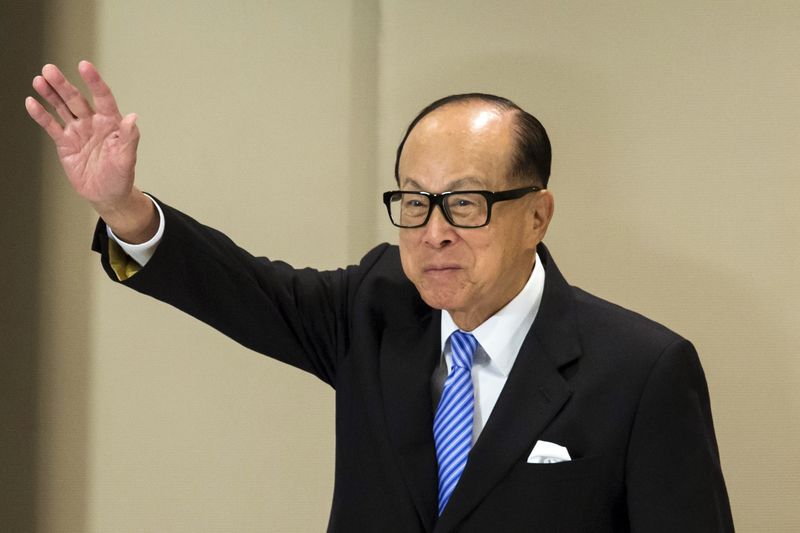By Denny Thomas
HONG KONG (Reuters) - Li Ka-shing's hectic start to 2015 has meant record Asia M&A, loan and equity deals so far this month - good news for investment bankers close to the 86-year-old Hong Kong tycoon's empire.
The brisk business - $108 billion (72 billion pounds) of Asia M&A makes it the best start to a year, according to Thomson Reuters data - raises hopes that the Chinese Year of the Goat could bring a windfall to a region that has been starved of fees.
Li's companies have single-handedly led the deal flurry.
Over the years, Goldman Sachs has emerged as Li's favoured bank, pulling in an estimated $220 million in fees from Li's two main companies Hutchison Whampoa and Cheung Kong Holdings since 2000. That tops the $136 million earned from Li by HSBC Holdings, traditionally Li's go-to bank for financing deals with its dominant local presence and a dedicated team to cover Li's companies. Bank of America Corp earned $131 million.
As Asia's richest man steps up the pace of overseas M&A, eyeing infrastructure, telecoms and retail businesses in Europe, and cranks up a new aviation lease unit, bankers see yet more deals. For banks, maintaining a close and strategic relationship with Li, his son Victor and their trusted lieutenant Canning Fok has become more critical as new advisers hover.
Bankers who have worked with Li and Fok say they are fair fee-payers who offer the market rate for financial advice. That makes it even more important to maintain close ties as Asian clients are often reluctant to pay for M&A advice.
Sluggish deal flows and drawn-out negotiations can frustrate banks in Asia, forcing some to rely just on initial public offers of shares and follow-on share sales for revenue. In contrast, Fok is known for the speed of his dealmaking.
"Everything they can do tomorrow, they want to do today. The sense of urgency is just ... they always want to do things," said one individual who has worked on Li's deals.
BIG REVAMP
Li this month has overhauled his vast business empire resulting in $47.7 billion worth of M&A, and has followed up with three overseas bids, including last week's of $15.4 billion for Telefonica's British O2 unit.
To finance these deals, Li is borrowing about $16 billion from banks and issuing $600 million in equity, taking his total deal volume to $83.4 billion, according to Reuters calculations.
If the O2 bid goes through, and the separate $3.8 billion acquisition of British rolling stock operator Eversholt Rail, it could be a sign that Goldman's grip on Li's dealmaking is slipping.
HSBC and boutique advisory firm Moelis & Co clinched the O2 mandate, while Royal Bank of Canada advised Li on the Eversholt purchase. The Hutchison bid for O2 also revealed something of a strategy shift, with Li willing to partner with private equity to run the business.
FEE BONANZA
Li's companies are the fourth-biggest fee payers in Asia over the past decade, Thomson Reuters data shows. State-owned China National Petroleum Corp tops the list, followed by BHP Billiton Ltd.
Bankers expect Li's deal flow to continue as the business revamp provides Hutchison with an additional $7 billion in firepower. "There's no dearth of funds. The restructure puts the companies in an even stronger position," said a person familiar with the Li family's thinking.
Some analysts say Hutchison's next stop for telecom consolidation will be Italy, a market where Li has previously tried but failed to strike a deal.
"If we can achieve consolidation on the right terms in relation to any of our properties, we will be there," Frank Sixt, Hutchison's group finance director said, when asked about plans for Italy. "But it will be premature to raise expectations," he added.
Bankers expect Li to eventually float his European telecoms business The Three Group, and IPO bankers are preparing for a potential listing of retail operation A.S. Watson over the next two years. Temasek Holdings paid $5.7 billion last year for a 24.9 percent stake in the business.
While there's money to be made working on Li's deals, it doesn't come easily.

"These guys are very demanding. When they want something, they want it now. That's the way they approach things," the first individual said.